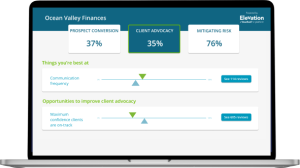Customer satisfaction is dead, long live client outcomes.
The FCA has placed delivering good outcomes at the heart of Consumer Duty, which comes into force at the end of July 2023. The new requirements will mean advisers need to forget everything they thought they knew about client surveys.
So what should you be doing?
To gather meaningful answers, you must ask your clients the right questions, which will be tied to the four Consumer Duty outcomes:
- Consumer understanding. Do your clients feel equipped to make good decisions based on the information you’ve provided? Is information clear and received at the right time?
- Price & value. Do your clients feel that they’re receiving value from their products and services (including your advice)?
- Products & services. Are products and services appropriate and meeting your clients’ preferences?
- Consumer support. Do your clients feel like they can access their products and services as reasonably expected? This should include any special requirements or personal preferences on how they prefer to engage.
In this article, we cover the type of questions you should be asking, how often you should ask them and what to do with the feedback you receive.
But first, a change to the advice process is also required. Advisers must clearly define clients’ goals. Without a defined outcome, it’s impossible to know if your client is on track to achieve it.
Customer satisfaction is dead, long live outcomes-based questions
To get the information you need, questions should:
- Be based on the 4 Consumer Duty outcomes
- Obtain how confident the client is feeling about achieving their goals
Use multiple choice questions rather than “free text”. This will make the responses easier to collate across the business. A Likert scale (strongly disagree to strongly agree) is easy for clients to relate to, so write your questions with this in mind.
Don’t forget you’re asking how a client feels. This is subjective rather than objective, but it is your client’s reality. Avoid being defensive if you receive negative feedback. Take it as valuable insight on how to improve.
You should set acceptable answer ranges for each question before sending out surveys. This makes it easier to spot issues when the responses come in.
How often should you ask for feedback?
Obtaining client feedback should be a continuous process, not just after a product sale. Regular feedback allows you to keep track of your clients’ feelings and identify any issues quickly. The frequency of feedback depends on your risk appetite, but once a year probably isn’t enough.
Gathering feedback from prospective clients is not only important for Consumer Duty – which applies to the whole consumer journey, including before they become a client – it’s also commercially beneficial for you. Surveying prospects shows you take feedback seriously and increases the likelihood of them becoming clients.
Elevation, our enhanced client survey, collects data after all prospect meetings, initial client meetings, and then after each annual meeting. These regular surveys keep your finger on the pulse of your clients, allowing you to identify and resolve issues quickly.
What to do with the responses
If you’ve asked the right questions, you’ll get valuable insights from the data. But what should you look for?
Trends and patterns at business and adviser level can help identify issues. Look out for:
- Decreasing conversion rates – this could be either a proposition or adviser issue
- Large differences between feedback for advisers – more adviser training could be required
- Falling scores in one area – review your processes in that area to look for improvements
- Falling scores overall – something has changed in your business. You should investigate internally and reach out to clients for more detailed feedback
You should also look for survey responses outside of your predetermined acceptable answer range. These will act as markers of risk and could mean rapid action is required.
Elevation helps to spot those trends and patterns through clear reporting, at both firm and adviser level. Covering both Consumer Duty and client experience, Elevation provides a clear picture of your business.
A low response rate shows poor engagement which should be acted on. Making feedback requests regular, and including them in your conversations, shows you value feedback and will increase response rates.
Making data-driven decisions also gives you a competitive edge by reducing intuition and guesswork. This approach is proven to lower risk and improve commercial decisions.
Turning Feedback into Action
Once you’ve analysed your client feedback data, it’s time to act. Defining acceptable answer ranges before surveying your clients makes it easy to hold yourself accountable to act on the data you get back.
If responses fall outside of your acceptable range, it could highlight risk or otherwise suggest that you’re falling short of the Consumer Duty.
Acting on your client feedback is a positive step to evidence how you’re meeting Consumer Duty. Be sure to record:
- The data which prompted the change
- What you’re going to change
- The anticipated outcome
- The date you’ll review the situation
Measuring against defined success criteria will help determine if changes have been effective.
Communicate the changes you’ve made, or haven’t made, to your clients. This demonstrates your commitment to improving their experience and increases the chance of them responding to future survey requests.
Acting on feedback, and being transparent in what you’ve done, builds trust and client advocacy. You’re also working towards creating better outcomes in line with Consumer Duty.
Creating your feedback strategy
Regularly obtaining, and acting on, client feedback is essential to every firm’s Consumer Duty strategy. But asking the right questions, regularly, is crucial.
Here are four actions to kickstart your client feedback strategy:
- Use a client survey with questions aligned to the 4 Consumer Duty outcomes
- Send surveys regularly, with additional ad-hoc surveys where issues are identified
- Make changes based on data, and track if they’ve been effective
- Communicate the changes you’ve made to your clients
___________________________
Elevation is an enhanced client survey from VouchedFor. It uses client feedback to drive business growth. Powered by 250,000 clients’ feedback, Elevation shows advice firms and advisers the specific actions they can take to meet the Consumer Duty and drive revenue growth.
Elevation offers completely private feedback, industry benchmarks, and a real-time Consumer Duty Report. That’s why more than 1,000 advisers from leading advice firms have chosen Elevation as their preferred survey solution for Consumer Duty.
To find out how Elevation can help you, or if you’re interested in getting content to help you meet your Consumer Duty, contact elevation@vouchedfor.co.uk




